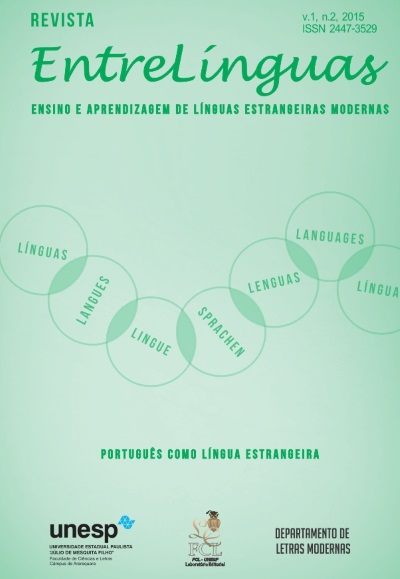An experience in PLE classes: the sensitivity and emotionality in reading classes and teaching of verbs in the past tense perfect and imperfect
DOI:
https://doi.org/10.29051/el.v1i2.8066Keywords:
Reading, Emotion, Sensitivity, Oral competence,Abstract
In this article, I try to show my experience with an activity related to sensitivity in a reading class of a PLE course (Portuguese as a foreign language) for students of Hispanic origin, from the planning stage until the time of evaluation, providing guidance for all the activities used throughout the process. The steps of this process are separated according to the students´ profile (we work with two specific groups of intermediate level students), the choice of material utilized, the strategies used, the dynamics applied, and the oral assessment, where, to my surprise, the students demonstrated a sensitivity that generated a very emotional environment, resulting in increased trust and complicity. Often these feelings are absent in a classroom, which allows the distance between the teacher and student to be an inhibiting factor at the time of oral practice of the language you are learning. The closeness between people provides a welcoming, pleasant environment which is more conducive to interaction and consequently more sensitive.Downloads
Downloads
Published
How to Cite
Issue
Section
License
Os manuscritos aceitos e publicados são de propriedade da Revista EntreLínguas. Os artigos publicados e as referências citadas na Revista EntreLínguas são de inteira responsabilidade de seus autores.
Transferência de direitos autorais – autorização para publicação
Caso o artigo submetido seja aprovado para publicação, já fica acordado que o(s) autor(es) autoriza(m) a UNESP a reproduzi-lo e publicá-lo na EntreLínguas, entendendo-se os termos “reprodução” e “publicação” conforme definição respectivamente dos incisos VI e I do artigo 5° da Lei 9610/98. O artigo poderá ser acessado pela rede mundial de computadores (Internet), sendo permitidas, a título gratuito, a consulta e a reprodução de exemplar do artigo para uso próprio de quem a consulta, desde que haja a citação ao texto consultado. Essa autorização de publicação 328 EntreLínguas, Araraquara, v. 1, n .2, p. 323-328, jul./dez. 2015 não tem limitação de tempo, ficando a UNESP responsável pela manutenção da identificação do(s) autor(es) do artigo. Os artigos publicados e as referências citadas na Revista EntreLínguas são de inteira responsabilidade de seus autores.











